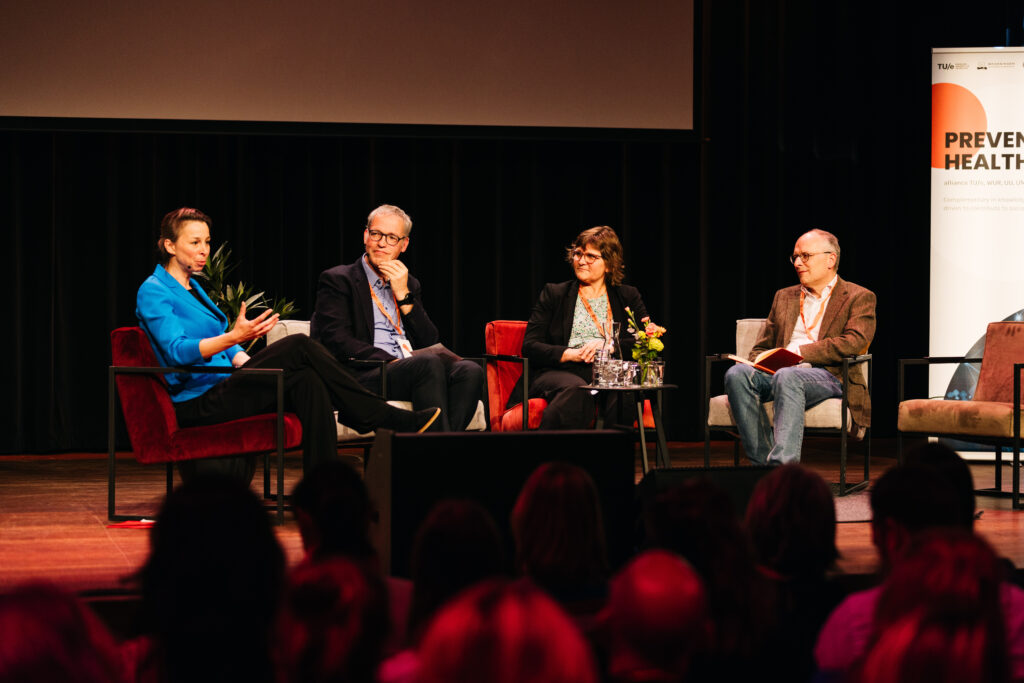On Wednesday, April 24, 2024, the halls of TivoliVredenburg in Utrecht resonated with the vibrant exchange of ideas and insights. Researchers, students, teachers, staff, and a diverse array of interested parties came together for an interdisciplinary conference on “Navigating Transitions.”
In an era characterised by escalating socio-economic and environmental challenges, the imperative for innovative solutions has never been more pressing. Against this backdrop, the conference posed a central question: How can science and education collectively contribute to navigating societal transitions during these challenging times?
Roman Krznaric set the tone: Advocating for Long-Term Thinking
Renowned social philosopher Roman Krznaric captivated the audience with his profound insights into the power of ideas to drive transformative change. As the author of the international bestseller, “The Good Ancestor: How to Think Long Term in a Short-Term World,” Krznaric is celebrated for his pioneering work on empathy and long-term thinking.

During his keynote session, Krznaric introduced a paradigm-shifting mindset centered around the concept of the ‘Good Ancestor,’ challenging attendees to transcend the constraints of short-sightedness and embrace forward-thinking actions. His philosophy, rooted in the belief that we all have a responsibility to contribute to a sustainable and inclusive future, resonated deeply with the audience.
By advocating for collaborative efforts across diverse fields of knowledge, Krznaric inspired attendees to harness the power of collective action in pursuit of lasting positive change. A message that stuck with the audience and set the tone for the rest of the day’s sessions.
Track 2: Empowering Healthier Communities Through Collaboration
Dedicated to tackling pressing health challenges in the Netherlands, the Institute for Preventive Health (i4PH) hosted a compelling track. Which kicked of by premiering the i4PH’s new introductory video.
The track then continued with an inspiring keynote session, by Florien van der Windt, Director of Public Health at the Ministry of Health, Welfare and Sport (VWS). She shared her insights on navigating the complex landscape of health challenges in the Netherlands, emphasising the importance of prevention, health promotion, and medical ethics. Highlighting the imperative of collaboration across governments, societal sectors, and the business community, she underscored the need to shift towards ‘the front end,’ where the emphasis lies on fostering a healthy society and prioritising prevention.
As van der Windt challenged attendees to explore how transdisciplinary researchers and policymakers can collaborate effectively, her keynote address set the stage for a dynamic and interactive panel discussion in which Lenneke Vaandrager (WUR) and Marcel Verweij (UU) joined the stage, offering an exchange of insights and chart a course towards a healthier future for all.

Attendees then attended one of two interactive workshops.
The first workshop delved into strategies for promoting healthy habits and creating environments conducive to well-being. The workshop was led by Tabea Sonnenschein (UU), Heidi Lesscher (UU) and Florine Kremer (WUR). Through an interactive interdisciplinary workshop, stategies and policies for a healthy future were discussed. The question was asked, what if they were world leaders? What strategies would they promote? This lead to interesting insights, and many new connections.

The second workshop explored the future frontiers of health, showcasing cutting-edge AI innovations and Living Technologies poised to revolutionise healthcare featuring four experts: Roy van der Meel (TU/e), Clara Belzer (WUR), Frederik Verweij (UU) and Sam van Beuningen (UMCU). It offered a captivating journey through groundbreaking discoveries in healthcare. From synthetic microbiomes to AI-driven insights into disease mechanisms, attendees witnessed the transformative potential of technology in shaping preventive health solutions.

A catalyst for change
The integration of preventive health into the conference’s theme of navigating societal transitions was vital to its success. As attendees discussed contemporary challenges, preventive health emerged as a cornerstone for resilient communities and sustainable futures. With an emphasis on prevention, health promotion, and collaboration, the conference showcased how interdisciplinary connections can help in addressing societal transitions. As participants left with new insights and strategies, the conference served as a catalyst for change, laying the groundwork for a future marked by resilience, innovation, and collective well-being.
Want to see more? Take a look at more pictures here.